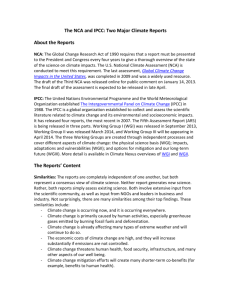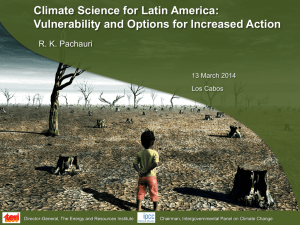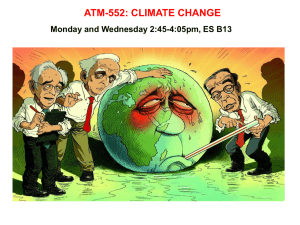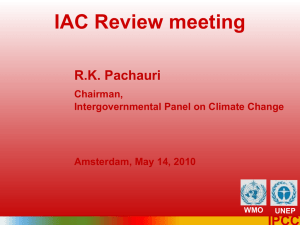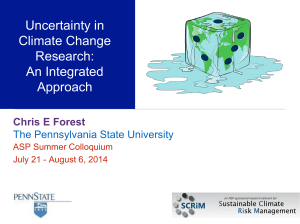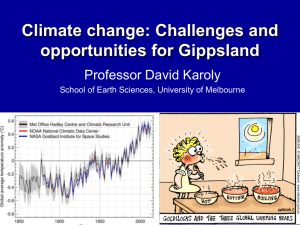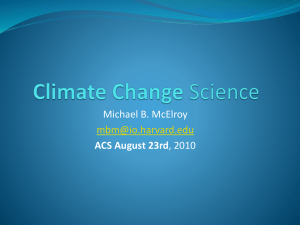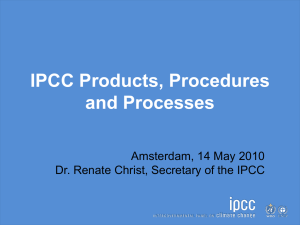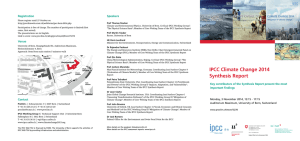- InterAcademy Council | Review of the IPCC
advertisement
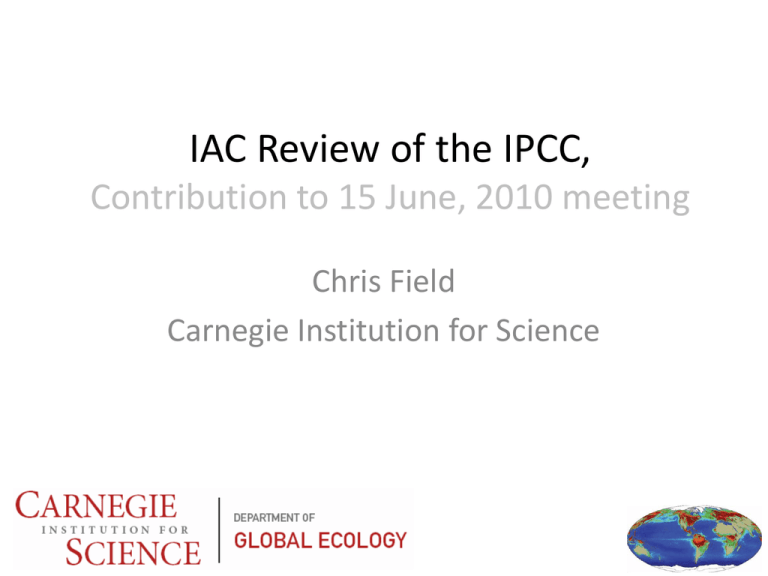
IAC Review of the IPCC, Contribution to 15 June, 2010 meeting Chris Field Carnegie Institution for Science Background and IPCC role • Director, Department of Global Ecology, Carnegie Institution for Science • Professor, Department of Biology, Stanford University • Professor, Department of Environmental Earth System Science, Stanford University • Faculty Director, Jasper Ridge Biological Preserve, Stanford university • Elected member: US National Academy of Sciences • Elected Fellow: American Association for the Advancement of Science • Elected Fellow: American Academy of Arts and Sciences • 20+ years of research on global carbon cycle, carbon-climate interactions, climate change impacts, biomass energy • Funding from Carnegie Institution, Federal Agencies, Private Foundations, once-removed private sector • CLA, WGII, AR4: Chapter 14, North America • Co-chair, WII, AR5 Opening comment • An IPCC report is a massive effort • IPCC coordinates the work of thousands of volunteer scientists • Thousands of scientists contribute to the work of the IPCC • Quality and accomplishments a wonderful credit to the commitment and integrity of the contributing scientists • And to the willingness of countries to work with the IPCC mandate of comprehensive, balanced assessments Two agendas • Specific questions from the IAC committee • Personal reflections on the strengths, weaknesses, and potential of the IPCC Questions from the committee • How has the assessment process evolved over the years? • What are the differences between working groups 1 and 2? • e.g., approach, use of non-peer reviewed literature, treatment of uncerainties, any pressures to be more conservative or more confident than the data warrants • What are my thoughts on other issues covered in the committee's statement of task? • What are plans for the fifth assessment? Evolution • Special Report on Regional Aspects to Regional Chapters • Uncertainty guidance • FAQs Comparing WGI, II & III • Organized research agenda: WGI, WGII, WGIII • Clearly defined expert community: WGI, WGII, WGIII • Clearly defined literature: WGI, WGII, WGIII • Ability to quantify uncertainty: WGI, WGII, WGIII • Interactions with other stresses: WGI, WGII, WGIII • Role for practitioners: WGI, WGII, WGIII • Relevance to everyday people, ecosystem, & activities: WGI, WGII, WGIII Treatment of uncertainties • Confidence and likelihood • Quantitative and qualitative estimates Highlighting key messages • Culture of the plenary approval sessions • Needs of each of the stakeholders • Challenge of crafting clear, crisp, accurate text in big, high-pressure sessions Plans for the AR5 • Effective communication of uncertainty • Integrity • Basic mechanisms • Multiple lines of evidence • Support for decisions under uncertainty • Concept of a pdf • Risk = probability x consequence • Nature of consensus Intrinsic uncertainty in climate sensitivity Roe and Baker Science 2007 Presented as risk Old view: An interconnected system Integrated Assessment Models Impacts, Adaptation, & Vulnerability Climate Models Integrated system approach Moss et al. Nature 2010 Major themes -- WGI • • • • Observations Carbon cycle & biogeochemical feedbacks Clouds & aerosols Near-term & long-term climate change • Predictability, projections, commitments, irreversibility • Sea level • Regional climate processes Major themes -- WGII • • • • Integration of climate science & climate impacts Broad range of assessed impacts Climate change in the context of other stresses Framing to support good decisions, including information on risk • Expanded treatment of adaptation • Integration of adaptation, mitigation, & development • Comprehensive treatment of regional aspects of climate change Increase in global mean temperature above 1990 level 5 5 4 4 3 3 2 2 1 1 0 0 -0.6 -0.6 Updated Reasons for Concern, 2009 Smith et al. PNAS 2009 Major themes -- WGIII • • • • • • Sustainable development Ethics & equity & climate policy Integrated risk and uncertainty Transformation pathways International/regional/national issues Investment & finance Personal reflections • • • • IPCC operations Strengths Challenges Opportunities IPCC operations • Mostly working-group led products • Mostly weak links among, plenary, chair, WG co-chairs, and secretariat • Limited scope for decisions without plenary approval IPCC is especially good at • Focused assessments • Clear group of experts • Large, cohesive literature in traditional scientific journals More challenging topics • Multi-sector assessments • Regional assessments • Impacts with and without development & adaptation • Quick responses to rapidly-changing needs Conceptual challenges • Finding the right balance between scientific precision and clear communication • Effectively communicating risk • Interacting and indirect impacts • Sustaining policy relevance without policy prescriptions Concluding thoughts • • • • Special challenges of regional assessments Insuring coordination among the WGs Country support IPCC governance IAC questionnaire 1. What role(s), if any, have you played in any of the IPCC assessment processes? 2. What are your views on the strengths and weaknesses of the following steps in the IPCC assessment process? Do you have any recommendations for improvement? Scoping and identification of policy questions Election of bureau including working group chairs Selection of lead authors Writing of working group reports Review processes Preparation of the Synthesis report, including the Summary for Policy Makers Adoption of report by the IPCC plenary Preparation of any special reports 3. What is your opinion on the way in which the full range of scientific views is handled? 4. Given the intergovernmental nature of IPCC, what are your views on the role of governments in the entire process? 5. Given that IPCC assessments consider a vast amount of literature, what are your views and suggestions for improvement on the sources of data and the comprehensiveness of the literature used, including non-peer-reviewed literature? 6. What are your views and suggestions regarding the characterization and handling of uncertainty in each of the working group reports and the synthesis report? 7. What is your view of how IPCC handles data quality assurance and quality control and identification and rectification of errors, including those discovered after publication? 8. What is your view of how IPCC communicates with the media and general public, and suggestions for improving it? 9. Comment on the sustainability of the IPCC assessment model. Do you have any suggestions for an alternative process? 10. Do you have any suggestions for improvements in the IPCC management, secretariat, and/or funding structure to support an assessment of this scale? 11. Any other comments IAC Statement of task Statement of Task The Review Committee is requested to perform the following tasks: 2.1. Review the IPCC procedures for preparing assessment reports including, but not restricted to: i. Data quality assurance and data quality control; ii. Guidelines for the types of literature appropriate for inclusion in IPCC assessments, with special attention to the use of non peer-reviewed literature; iii. Procedures for expert and governmental review of IPCC materials; iv. Handling of the full range of scientific views; and v. Procedures for correcting errors identified after approval, adoption and acceptance of a report. 2.2. Analyze the overall IPCC process, including the management and administrative functions within IPCC, and the role of UNEP and WMO, the United Nations system and other relevant stakeholders, with a view to strengthen and improve the efficiency of the assessment work and effectively ensure the consistent application of the IPCC Procedures. 2.3. Analyze appropriate communication strategies and the interaction of IPCC with the media to ensure that the public is kept apprised of its work. 2.4. Prepare a report on the outcome of the activities referred to above, including: i. Methodology of the report preparation and measures taken to ensure high quality of the report findings; ii. Recommendations for amendments to the IPCC procedures; iii. Recommendations concerning strengthening the IPCC process, institutions and management functions; iv. Any other related recommendations; and v. Outline of a plan for the implementation of recommendations.
